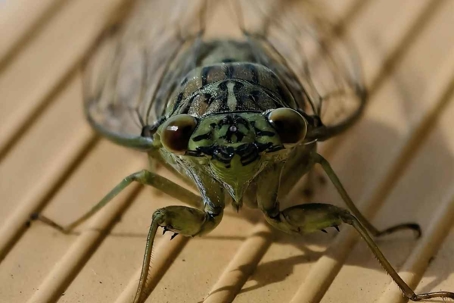Can Cicadas Bite?
Cicadas are generally harmless to humans and are not considered biting insects. These bugs do have mouthparts called piercing-sucking mandibles that they use to feed on plant sap, but these mouthparts are not designed to pierce human skin. On very rare occasions, a cicada might try to probe the skin if it lands on you, but it typically cannot penetrate the skin deeply enough to cause a true bite.
If a cicada does make contact with your skin, you might feel a slight pinch or mild scratch, but it’s not venomous, infectious, or harmful. Unlike mosquitoes or horseflies, cicadas do not feed on blood, so there’s no risk of disease transmission through a bite.
Cicadas don’t bite people in any meaningful way, and even accidental nips are harmless.
Do Cicadas Bite?
Cicadas rarely bite people at all, but there are a few very specific situations where contact with human skin might result in a minor pinch:
Handling or grabbing cicadas – If someone tries to pick up or move a cicada, the insect may instinctively press its mouthparts against the skin. This is more a reflexive “pinch” than a true bite.
Being trapped against skin – If a cicada gets caught between clothing and skin, it may press its mouthparts or legs against the body as it tries to escape, giving the sensation of a small pinch.
Young or recently molted cicadas – Newly emerged cicadas (teneral adults) are softer and may move awkwardly. If handled, they could momentarily contact the skin with their mouthparts.
Unusual stress or threat – A cicada under extreme stress might make repeated contact with whatever is nearby (including a human), but it still cannot pierce skin to feed.
Even in all of these situations, cicada “bites” are harmless, non-venomous, and do not transmit disease. Most people experience nothing more than a brief startle or minor pinch.
Cicada Bites
Cicadas are not known to bite or sting humans intentionally, but they can sometimes use their mouthparts to probe human skin by mistake. Their mouths are designed for piercing and sucking plant fluids, not for biting animals or people. However, if a cicada does pierce your skin, it’s usually accidental and not dangerous.
The main risks associated with a cicada “bite” are minimal but can include:
Mild Skin Irritation: The small puncture site may become red, itchy, or slightly swollen, similar to a mild insect bite.
Secondary Infection: As with any small skin injury, there’s a slight risk of infection if bacteria enter the site. Cleaning the area with soap and water and applying an antiseptic can help prevent this.
Allergic Reaction (Rare): Some individuals may experience minor allergic reactions like localized itching or hives, though severe responses are extremely uncommon.
Startle or Anxiety Response: Cicadas are large and loud; people may react strongly when they land suddenly, potentially leading to minor injuries from jumping or swatting them away.
Cicadas don’t carry diseases, inject venom, or feed on blood, so their presence poses no true medical threat. They’re harmless to humans, pets, and property—though their numbers and noise can be overwhelming during emergence years.
What Do Cicada Bites Look Like?
True cicada bites are extremely rare, and in most cases, cicadas don’t pierce human skin at all. However, if a cicada does manage to make minor contact with skin—usually by pressing its mouthparts or legs—you might see the following:
Small, superficial red mark – Usually just a tiny dot or pinch mark, similar to a mild scratch.
Slight swelling or raised bump – This may occur if the skin is sensitive, but it’s generally minor and short-lived.
No puncture wound – Unlike mosquito or horsefly bites, there’s no actual penetration of the skin.
Minimal irritation or itching – Some people may feel a tiny stinging sensation for a few seconds, but it doesn’t persist.
If you notice a bite-like mark after contact with a cicada, it’s almost certainly just a superficial scratch or irritation from the legs or claws rather than a true bite.
What To Do About Cicada Bites
If you’re accidentally “bitten” or poked by a cicada, there’s no need for alarm. Their mouthparts aren’t built to cause real harm, but it’s still smart to care for the area properly to prevent irritation or infection. Here’s what to do:
Clean the Area: Gently wash the affected spot with soap and warm water to remove any dirt or bacteria.
Disinfect: Apply an antiseptic or rubbing alcohol to reduce the risk of infection.
Soothe the Skin: If the area feels itchy or irritated, apply a cool compress, hydrocortisone cream, or an over-the-counter anti-itch lotion like calamine.
Avoid Scratching: Scratching can introduce bacteria and increase the chance of infection.
Monitor for Signs of Infection: Keep an eye out for redness, swelling, warmth, or pus. If any of these develop—or if the discomfort worsens—seek medical attention.
Address Allergic Symptoms: Although rare, if you experience hives, dizziness, or difficulty breathing, seek emergency care immediately.
In almost all cases, cicada “bites” heal quickly without complication. Simple cleaning and minor first aid are usually all that’s needed.

